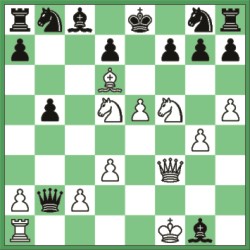|
Time
Out
Learning the game Chess
Want to
learn chess? Well, you have to play a lot of games. You must
become a chess addict, if not fanatic. That is how players
have addressed the question for generations. The modern approach,
however, is a bit different. It is not really enough to play
thousands of games. You have to note them down, spot your
errors, and make sure that these are not repeated in future.
Strangely enough, most amateurs or coffeehouse players tend
to make the same mistake again and again. They learn nothing
and forget nothing!
Start
from the ending! You must know how to checkmate with a rook,
two bishops and bishop and a knight when there is no pawn
left to promote. Then there are standard ways of playing different
types of endings. For example, one pawn may not always be
enough for a win. You have to master the technique of escorting
it with your king to the eighth rank. Endings can be unfathomably
complex.
Once you
know what to do in simple endings, you have to learn how to
handle the middlegame. This is the most difficult part of
the game in the sense that original positions arise in every
encounter. You must know the standard positions where a kingside
attack can be launched and be familiar with the tactical tools
like double check, discovered check, double discovered check
and so on. And don't forget the lethal power of a knight fork!
You have to play a direct attacking game during your formative
years. I don't remember who said that in chess a player must
learn how to run and then crawl with serpentine nuance. Well
said! Slow positional play is not for a beginner.
Finally,
you have to open the game with some move. Again, a beginner
should rely on straightforward development. The general principles
demand that you bring your minor pieces into play early in
the game and avoid unnecessary pawn moves. Then castle and
try to activate your major pieces. You are right; it's not
that simple. Well, we will look into it in (near) future.
Enjoy
the fireworks in the following game.
White-Adolf
Anderssen
Black-Liones Kieseritzky [C33]
'Immortal game' London 1851
1.e4 e5
2.f4 exf4 3.Bc4 Qh4+ 4.Kf1 b5 5.Bxb5 Nf6 6.Nf3 Qh6 7.d3 Nh5
8.Nh4? Qg5 9.Nf5 c6 10.g4? Nf6 11.Rg1 cxb5? 12.h4 Qg6 13.h5
Qg5 14.Qf3 Ng8 15.Bxf4 Qf6 16.Nc3 Bc5 17.Nd5 Qxb2 18.Bd6?
Bxg1 19.e5 Qxa1+ 20.Ke2 1-0

Position
after 19.e5
-PATZER
Copyright
(R) thedailystar.net 2005
|
